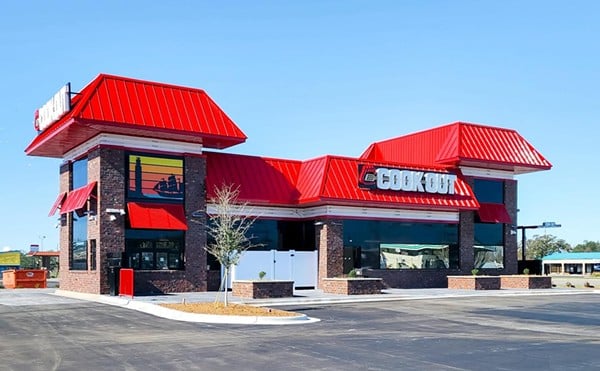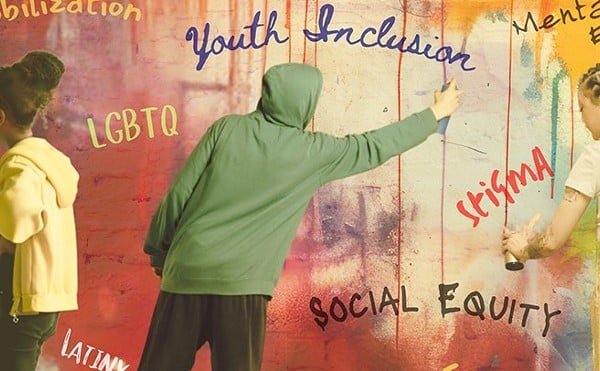
Michael Tisserand was born in the Midwest but had a long-running love affair with the city of New Orleans. He lived there off and on for nearly 20 years, including seven as the editor of the alternative newsweekly Gambit, which is how I got to know him. Over the years, he has become a friend.
Two years ago his dream took an extreme beating at the hands of Hurricane Katrina and her aftermath, and the Tisserand family, after living with friends near Lafayette, La., for two months, eventually relocated to Evanston, Ill., where his wife Tami, a pediatrician, found a job.

I recently chatted with Tisserand about the book and his experiences during and after Katrina, in advance of his visit to Carmichael’s Bookstore next week.
LEO: What were your goals in writing the book?
Michael Tisserand: When I was writing and I wasn’t sure how to proceed, I imagined someone asking me, “How does it feel?” How does it feel when your city drowns, when you don’t know if some of your friends are all right, when the world as you know it drops out from under you — and now you have to find a school for your kids.
Two years after the flood, people have their ideas of what happened. Depending on their political leanings, they think it’s a story about Bush’s incompetence, or about poor people’s inability to fend for themselves, or whatever. By writing about kids — my own kids and others — I hoped to introduce a different kind of Katrina story.
LEO: Has writing about it helped? Was it cathartic?
MT: I found it to be anti-cathartic. It just filled my head with these images all over again. When I sat down to write “Sugarcane Academy,” I had just moved to Chicago, I was upset about the move, things weren’t at all resolved between my wife and me, and now my new job was finding a story in all this with a beginning, middle and end.
The catharsis has been all in the past month, when I get to present the book and have discussions in bookstores and schools, and one-on-one with readers. At almost every book signing, there’s someone who is from New Orleans or the Gulf Coast and went through Katrina, saw something about the event in the paper, and wanted to meet other people who went through this. Katrina was a public event, and we need to keep talking about it, out in the open, in public. Isolation is dangerous for both individuals and for the future health of New Orleans.
LEO: I remember talking about this with you several years ago, the whole “bowl of toxic soup” scenario that was forecast if a hurricane hit New Orleans and the levees failed. After all of this, what surprised you?
MT: We always imagined a hurricane hitting New Orleans. We did not imagine that the floodwalls would fail in a relatively moderate hurricane like Katrina was when it went through New Orleans. I never imagined how all-encompassing it would be. Looking back I know I must’ve been in a state of denial or naïve, but I never imagined how much it would change.You know it but you don’t know it. You don’t know what kind of response you’re going to have to come up with. I never imagined we would be starting a school and that we’d be stuck outside New Orleans at the beginning of the school year and have to figure out what to do with our kids.
LEO: It seems serendipitous that the families were able to resolve that in a really interesting way.
MT: It was (serendipitous) that Paul Reynaud was there. Everything else flowed from that, that he was not only willing to take this on but wanting to. His attitude kept moving everything forward.
LEO: Where’s Paul?
MT: He’s back in his first grade classroom. He’s doing well. His parents and family are OK. He’s facing a new classroom of first grade kids who are all lucky to have him for a teacher.
LEO: Did you see your story, the beginning, middle and end, fairly clearly?
MT: No, not at all. That was seen for me. Tim, the editor of my zydeco book, became a friend and has children the same age as my kids. He was one of the many calls and e-mails I received from friends who wanted to know how we were doing. I was doing the Submerged series, and Tim asked about the kids. I explained Sugarcane Academy and how Paul was leading them on field trips and having them do hurricane journals. Tim stopped me and said, “That’s your book. It has a beginning, middle, end and a great title.” It was late September or October and there was a question whether publishers would still be interested in Katrina books or whether they’d had their fill. But Tim saw this as something very much about going through Katrina but also about children and improvising. In fact, at book readings I’m finding that a lot of people showing up are teachers and principles who see it as a portrait of teaching in unusual circumstances.
LEO: It seems Paul was able to practice a more pure form of teaching.
MT: That’s exactly what he called it — pure teaching. Nobody breathing down his neck and telling him the 45 minutes of reading was up and it’s time for math now. As a New Orleanian he uses the language of jazz to describe his technique — if the kids are into it, he would like to keep riffing.
LEO: You share deeply personal information in the book.
MT: Yes, there are personal details about my kids — their nightmares and so on. We talked about that and I’ve explained to them more than once how we should describe our feelings so people who did not go through this disaster will understand. Part of our story is that we had a lot of different types of considerations, like all New Orleanians. Katrina was the same thing and a half a million different things.
LEO: How does your wife, Tami, feel about seeing such personal things in print?
MT: There were some things not shared — for example, her parents were in ill health. After we moved closer to them, she got to spend the last six months of her father’s life with him in a profound way.
Tami’s a little more pragmatic than I am. I had more of a feeling of let’s just stay and see what happens. One of the first things we knew was that Tami lost her job. The first conversation with her boss made it clear, he felt like there was no more practice left. Then he killed himself shortly after we got back to New Orleans. He was a beloved pediatrician, a native New Orleanian. He had chronic pain that made each day more difficult for him. Like all of us, the world as he knew it dropped out from under him. Not knowing if we’d get back for a year, Tami posted her resume and got a bite from the Chicago area. We’re both Midwesterners. It’s where we’re familiar, and close to family.
LEO: Do you think the Tisserand family has anything like resolution at this point?
MT: I think we do. Even though we’re not living in New Orleans, I still feel like the future of my family is bound up in the future of the city of New Orleans. I feel like all of us in our own way are helping to fight for justice for the city, for just treatment, for the city to be a safer place like Evanston or Louisville for families to live and thrive.
I watch the skies every hurricane season with undiminished fear that the levees and wetlands are not there to protect our city. We knew FEMA was unprepared and how Bush had turned it into an ineffectual agency. I was well aware the wetlands were decimated, the same way we know global warming is a crisis. But do we wake up with global warming as the first thing on our minds? Not really. I can say the future of New Orleans is one of the first things I think about in the morning and one of the last things when I go to sleep at night.
Contact the writer at [email protected]





